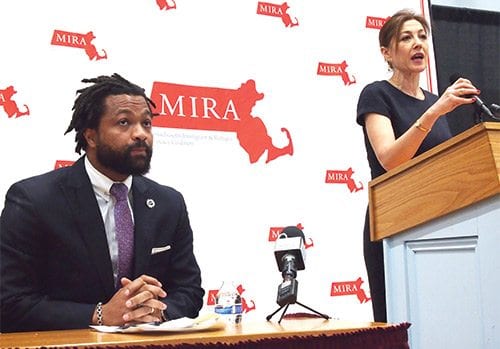
Several hundred immigrant activists from across the state filled Gardner Auditorium Monday in an annual appeal to the Massachusetts Legislature in support of immigrant-friendly laws.
While the activists, who were organized by the Massachusetts Immigrant and Refugee Advocacy Coalition, received a warm reception at the State House, many present expressed concern about the growing expression of anti-immigrant sentiment boiling to the surface of U.S. presidential politics.
“Folks are talking about building a wall in this country,” said keynote speaker Junot Diaz. “That wall is the enemy and stands as a concrete symbol of the hate we immigrants face.”
In the current election cycle, presidential candidate Donald Trump’s pledge to build a wall has captivated the attention of a vocal demographic of American whites who have been packing into stadiums and gymnasiums across the country to show support for the most overtly nativist candidate this country has seen in decades.
But far from dissuading immigrant activists in Massachusetts, Trump’s rhetoric has emboldened many Massachusetts immigrants to pursue naturalization, according to Sarang Sekhavat, federal policy coordinator for the MIRA Coalition.

Author Junot Diaz, state Sen. Linda Dorcena Forry and state Rep. Evandro Carvalho enjoy a moment during the MIRA Coalition’s annual lobby day at the State House.
“Not only are more people applying for naturalization because of the hateful rhetoric, we are also getting a lot more volunteers coming in and helping,” he said. “And not just immigrants. Many of them are longtime Massachusetts residents.”
That growing base of volunteers was dispatched Monday to press legislators for support of MIRA’s mix of bills and budget items: drivers licenses for undocumented immigrants and those applying for refugee status, in-state tuition for undocumented students and expanded learning opportunities for English language learners among the many.
“The programs we are advocating for help the commonwealth as a whole,” said MIRA Coalition Executive Director Eva Milona.
In addition to immigrant-specific bills and line items, MIRA Coalition members are advocating for funding for adult basic education, funding to combat domestic violence, job training programs and other programs that benefit immigrants and non-immigrants alike. Milona acknowledges the difficulty of passing the driver’s license bill, which has been stalled for several years.
“Not everybody see the bill as something that provides safety,” she said. “People see it as a benefit to unauthorized workers. The point we are making is that they’re driving anyway. We want them to be safe. It’s unfortunate that 12 states, including states with Republican governors like Texas, have passed laws like this, but Massachusetts has not.”
Beyond the marbled halls of the State House and outside the solidly Democratic confines of Boston and its wealthier suburbs, in the last month’s presidential primary legions of Trump supporters gave their candidate the greatest margin of victory he received in any state – 49 percent – even beating Mississippi by two percentage points.
That level of Trump support signals a strong anti-immigrant streak in the overwhelmingly Democratic state.
Speaking to the Banner, Diaz pointed to the growing gap between the wealthy and the poor as a part of Trump’s appeal.
“I think what we have is a situation where the economic crimes of our elite have become so outrageous that they require a bigger scapegoat than they’ve ever needed to shift attention away,” he said. “Inequality has never been greater than it is now. I’m not surprised that some people are beating the drum of nativism and xenophobia.”
Trump’s opening salvo in the presidential election – a pledge to build a wall coupled with a denunciation of Mexican immigrants as criminals and rapists – seems to have tapped into the ugly zeitgeist of American insecurity. Trump, whom Diaz refers to as the “hype man of conservative politics,” has continued to ride the wave of fear, growing a loyal following.
Speaking to the gathering of activists at the State House, Diaz urged them to embrace the politics of inclusion.
“If folks want to organize around building a wall, we must organize politically to build a bridge,” he said. “Let the agents of fear and hate talk endlessly about their walls. And we who have given so much to this country, we who are the essence of this country, we who are this country will talk about the bridge. And we shall see whose vision will survive in the future. We shall see what the future really needs: a wall or a bridge.”






